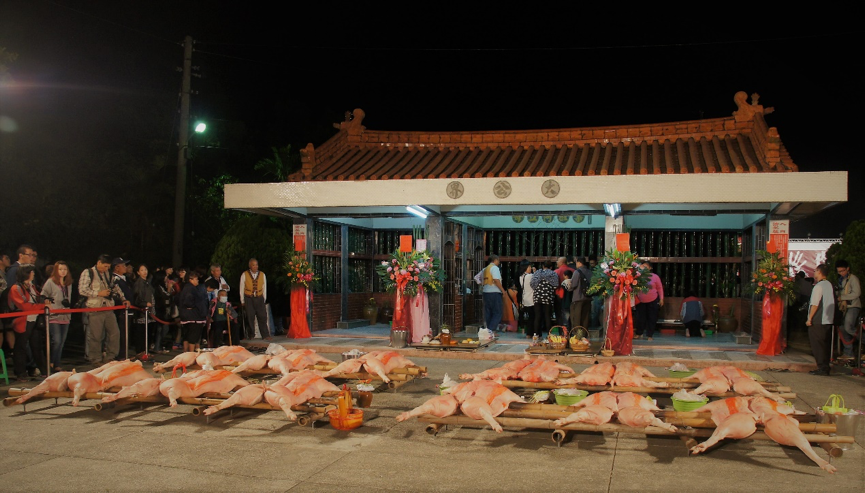

-
- 111th Academic Year
- The Avenue of NCKU Heritage – Area of Cultural Assets
- The Avenue of NCKU Heritage – Area of Environment and Ecology
- From country to city: Taveron and Han integration
- Kyrie: Pestilence and faith in the salty area
- Highlighting Western Chu-Wei
- Ginza: Commercial tracks from harbors to modern streets
- Tavocan and the Town of Hills
- The Museum: Ecological village and eco-museum
- The Stories about Major South Gate of Fu-Chen (Tainan)
- Modern new generation
- 110th Academic Year
- The Route of NCKU Students - The Cultural Assets Area
- NCKU Students' Route – Area of Cultural Assets
- Migration and Settlement of the Siraya Tribe
- Zengwen Creek’s nine bends and 18 turns, with astronomy, hydrology and humanities
- Exploring the Old Industries of Tainan City
- Journey of Beauty
- The Narrations of Water Resources, Agriculture and Livestock Industries
- Exploring Old Yuejin Harbor Area
- Lâu-Nuā Sió Sai Kha
- Highlighting Western Chu-Wei Area, Yu-Ler Street & Eastern Gate
- 109th Academic Year
- NCKU Students' Route – Area of Cultural Assets
- NCKU Students' Route – Area of Environment and Ecology
- Migration and Settlement of the Siraya Tribe
- Old Taijiang Inner Sea: Its Previous and Current Existence
- Lâu-noā Sió-sai-kha
- Exploring the Old Industries of Tainan City
- The Exploitation of the Works of Nature-Journey about The Frost and The Flower of Salt
- Badlands and the Mountain City
- Age-old Stories from the South of the City
- The Magnificent of Zheng-Xing Street
- 108th Academic Year
- The Route of NCKU Students─The Cultural Assets Area
- NCKU Students' Route – Area of Environment and Ecology
- Ecology of Fishery and Sea Salt Harvesting─ The Nature and Culture of Tai-Jiang Lagoon
- Migration and Settlement of the Siraya Tribe
- Age-old Stories from the South of the City
- Exploring the Old Industries of Tainan City
- The Narrations of Water Resources, Agriculture and Livestock Industries
- Technology and Humanities Science Park and Cultural Archeology
- From Kū-Lâu to Sin-Lâu Hospital
- Folk Delicacy around Minor West Gate Area
- 107th Academic Year
- The Avenue for NCKU Students
- Exploring Old Occupations in Tainan
- Secret Literary Path of Tainan
- Migration and Settlement of the Siraya Tribe
- Old Tai Jang Inner Sea: Its Previous and Current Existence
- Five-Canal Harbor Area: The Water Gods and Import-Export Tradesmen
- Tradition and Innovation: Zhengxing Street and the Grand Market(Da Caishi)
- The Water Resource of Tainan Area
- The Grace of Yanshui Harbor: Rejuvenation of Yanshui and Hopi Settlements
- 106th Academic Year
- The Avenue of NCKU Students
- Gate of Urn-Shaped Castle and the Stony Plates
- Siraya People’s Migration and Their Journey to Settlement
- Zeelandia and the Retrospective Anping
- Old Taijang Inner Sea (Taijang Nei Hai ) : Its Previous and Current Existence
- Tradition and Innovation- Zhengxing Street and the Grand Market (Da Caishi )
- Qing Dynasty Government Official’s Trail-Chunan Old Street and Zhenbei Fang
- Five-Canal Harbor Area, the Water Gods and Import-Export Tradesmen
- Fantastic Trips to Know Sugar and Salt production
- Chikan Park Area and Historical Traces
- Secret Garden of Literature- From Taiwan Administration (Taiwan Fu) to Tainan Prefecture Hall (Tainan Zhou Ting)
- The Water World of Tainan Area
- 111th Academic Year
-
-
-
Migration and Settlement of the Siraya Tribe
Route Introduction

The Grand Kuwa of Jibeshua
I follow the worshipping rituals of the culture,
and therefore I exist.In the tribe of Jibeshua in Dongshan District, there are the eastern, western, southern and northern kuwas, in addition to the Grand Kuwa. Alid (A-Li-Mu) is worshipped in the Grand Kuwa, which is also the major venue for the Night Sacrifice.
-